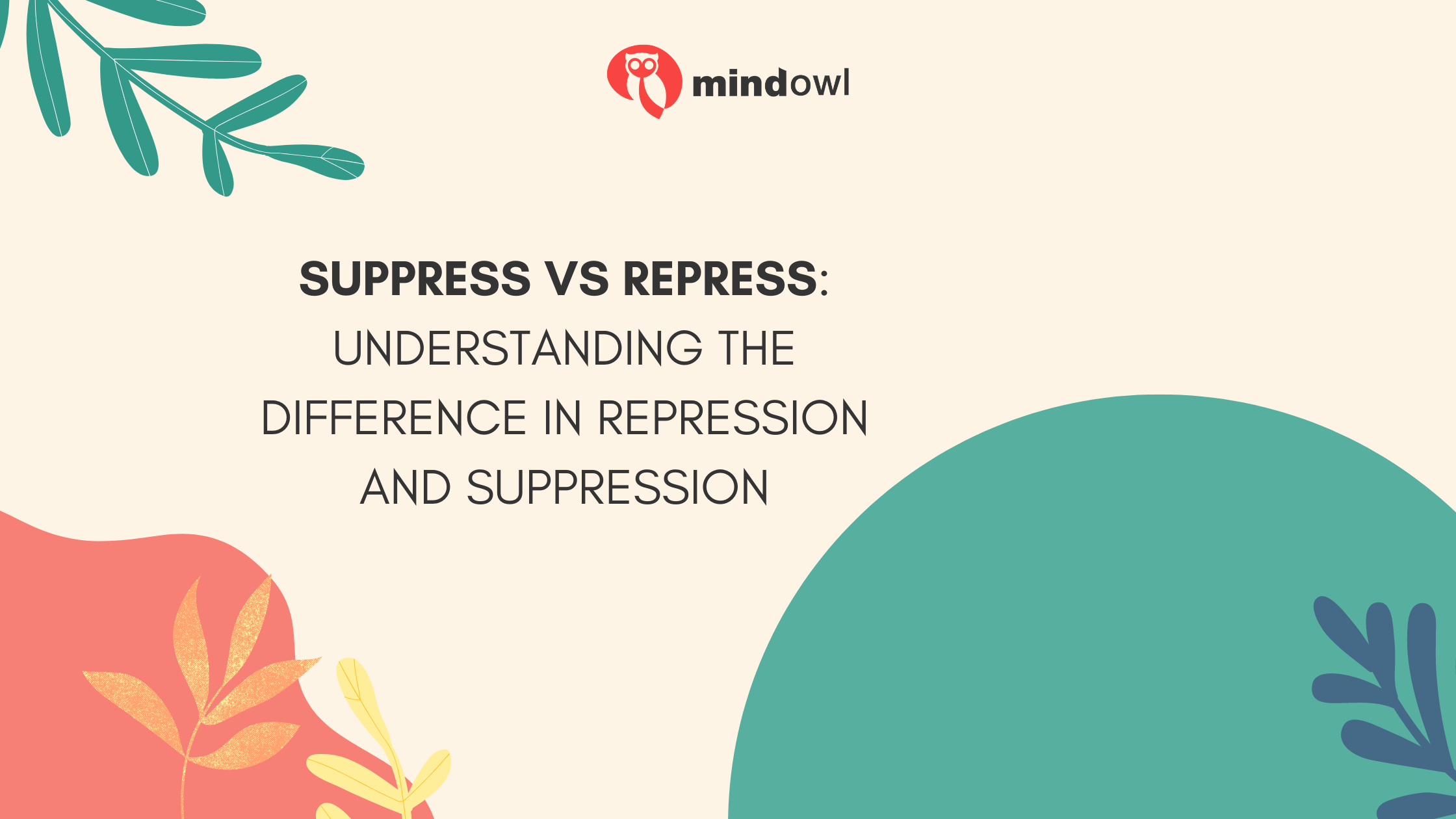Suppressing and repressing – are often used interchangeably when discussing how we deal with unwanted thoughts and emotions. But there’s a key distinction between these defence mechanisms.
Suppression involves consciously forcing uncomfortable feelings out of awareness – a voluntary pushing down of thoughts. Repression is an unconscious process where thoughts, memories, and desires get blocked from the mind entirely.
Understanding suppression versus repression is crucial for better managing your inner world. Relying too much on either can have consequences – suppression requires constant effort, while repression may lead to psychological issues.
This article will guide you through the differences and impacts of both. Get ready to break down these concepts in a simple way. Let’s unwrap this mystery together!
Key Takeaways
- Repression happens without our knowledge, pushing unwanted thoughts deep into the mind. Suppression is when we choose not to think about something on purpose.
- Both repression and suppression can lead to stress, anxiety, depression, and even physical health issues if we don’t deal with our emotions properly.
- Writing down feelings, talking about them, and therapy are good ways to handle these hidden or ignored emotions.
- Understanding the difference between these two can help us find better ways to cope with tough feelings.
- Regular exercise and finding hobbies can also help release built-up tension from repressed or suppressed emotions.

Understanding the Differences Between Repression and Suppression
Definitions of repression and suppression
Repression acts like a hidden force in the mind, quietly pushing distressing thoughts and memories out of conscious awareness without us realising it. It’s an unconscious mechanism, meaning people don’t choose to use it; it just happens independently.
This process helps keep uncomfortable feelings or traumatic memories tucked away, so they don’t cause constant pain.
Suppression is different because it involves a deliberate choice to avoid thinking about unsettling thoughts or feelings. When someone uses suppression, they are actively deciding to put certain emotions or desires on hold to cope with a situation more effectively.
Unlike repression, this defence mechanism requires conscious effort and awareness about what’s being set aside.
Differences in conscious effort and unconscious strategy
Suppression takes a conscious effort. You know you are doing it when you push away uncomfortable thoughts or choose not to show anger in the middle of an argument. It’s like deciding not to talk about a breakup because it brings pain.
This act involves control and awareness over what you’re feeling but choosing to set those feelings aside.
In contrast, repression happens without your notice. Your mind hides away memories and emotions that are too tough to handle. Imagine forgetting an embarrassing moment from your childhood; that’s repression at work.
Unlike suppression, where you have a choice, repression acts as the brain’s automatic defence mechanism, shielding you from emotional distress without your consent.
Effects of Repression and Suppression on Mental Health
Impact on emotions and feelings
Suppressing or repressing emotions doesn’t just keep feelings out of conscious awareness. It often leads to stress, anxiety, and depression. This isn’t surprising when we consider that common targets for these processes include anger, fear, sadness, guilt, and shame—powerful emotions that can significantly affect mood and outlook.
Hiding these feelings from ourselves or attempting to push them away without addressing the root causes can lead to additional problems like memory loss or emotional numbness. These symptoms suggest an unhealthy relationship with our own inner experiences and highlight the importance of dealing with our emotions openly rather than denying them space to exist.
Potential mental health disorders
Repressing emotions often leads to stress, anxiety, and depression. These are common mental health disorders linked with not addressing one’s feelings properly. Repression pushes these emotions deep into the subconscious mind, where they can fester and impact one’s overall well-being.
Studies highlight repression as a potential health risk factor for several disorders. Effects on mental health might also show up as physical symptoms. High blood pressure, skin conditions, fatigue, obesity, headaches, dizziness, and back pain can all trace back to repressed or suppressed emotions.
This connection underscores the importance of dealing with our inner turmoil head-on rather than pushing it aside or burying it within ourselves.
Healing from Repression and Suppression
Identifying repressed or suppressed emotions
Finding out if you have repressed or suppressed emotions can be a tough journey. It’s key to know the differences and signs so you can start healing.
- Look for sudden mood changes. If your mood swings without a clear reason, it might be suppressed feelings poking out.
- Pay attention to body signals. Headaches, stomach issues, or unexplained pain can often signal emotions you haven’t dealt with.
- Notice patterns in your behaviour. Avoiding certain topics or people? It could mean you’re suppressing feelings linked to them.
- Think about your dreams. Sometimes, what’s playing on repeat in your sleep gives clues to the emotions buried deep inside.
- Spot if you’re using distractions often. Burying yourself in work, hobbies, or scrolling through social media non-stop? This might be your way of keeping unpleasant feelings at bay.
- Reflect on moments of overreaction. Blowing up over small things can be a sign of deeper issues not being addressed.
- Be honest about your fears. Fears that seem bigger than they should might be masking hidden emotions.
Taking these signs into account can help you understand if there are emotions you’ve been ignoring or pushing away without realising it. Recognising this is the first step toward working through these feelings and finding healthier ways to cope.
Coping strategies and therapy options
Dealing with repressed or suppressed emotions is tough. However, knowing the right coping strategies and when to seek therapy can make a big difference. Let’s talk about how you can address these feelings and start healing.
- Journaling – Write down your thoughts and feelings. It helps you understand yourself better and spot patterns in your behaviour that could be due to repression or suppression.
- Mindfulness practices – Activities like meditation and yoga focus your mind on the present, helping you acknowledge and deal with your emotions rather than avoiding them.
- Setting healthy boundaries – Learning to say no and keeping distance from situations or people who trigger negative emotions can reduce the need for repression or suppression.
- Open communication – Talking about your feelings with trusted friends or family members can offer relief and lessen the burden of bottled-up emotions.
- Art therapy – Expressing yourself through art allows you to explore repressed emotions safely and creatively, which might be hard to put into words.
- Cognitive-behavioural therapy (CBT) – This approach helps you identify negative thought patterns leading to emotional suppression, teaching you healthier ways to cope.
- Psychodynamic therapy – Focusing on exploring unconscious processes, this type of therapy can uncover deep-seated repressed emotions affecting your mental health.
- Group therapy – Sharing experiences with others facing similar issues provides support and offers perspectives that might help in understanding your own feelings better.
- Physical exercise – Regular physical activity releases endorphins, improving mood and reducing stress, which often results from ongoing repression or suppression of emotions.
Working with a therapist comes highly recommended for anyone struggling with repression or suppression as they provide professional guidance tailored to individual needs, ensuring effective processing of these complex dynamics.
Controversies and Debates About Repression
Freud’s theories and modern research
Freud’s ideas laid the foundation for understanding the human psyche, focusing on unconscious forces and defence mechanisms. Researchers today still study these concepts, testing their relevance against modern psychological findings.
The debate revolves around whether Freud’s notion of repression plays as significant a role in mental health as he posited.
Recent studies have sought to reconcile Freudian theory with neuroscientific discoveries, examining how unconscious processes influence behavior. While some of Freud’s hypotheses have been challenged by new data, his contributions remain a cornerstone in both clinical practice and academic research.
Critics and supporters alike continue to explore the intersection between Freud’s theories and contemporary psychology, sparking discussions that push the field forward.
Discussion on the use and effectiveness of repression
Debates persist about the effectiveness of repression as a defense mechanism. Ongoing research explores its impact on mental and physical health, shedding light on its controversial nature in psychological discourse.
Moreover, the distinction between suppression and repression sparks discussions relating to their implications in self-improvement strategies.
The use of repression remains contentious due to differing perspectives surrounding its effectiveness as a coping mechanism. Freud’s theories and modern research fuel ongoing debates within psychology regarding the practicality of repressing painful emotions.

Taking Control of Repression and Suppression
Importance of acknowledging and processing emotions
Acknowledging and processing emotions is crucial for maintaining mental and emotional well-being. Ignoring or suppressing feelings can lead to increased stress and potential mental health disorders.
Therefore, identifying repressed or suppressed emotions is the first step in addressing them. This process involves recognising the signs of avoidance or denial and then finding healthy coping strategies, seeking therapy if necessary to work through these emotions.
Finding a balance between suppression and expression
It’s crucial to acknowledge and process emotions for mental well-being, aiming for a healthy balance between suppressing and expressing feelings. By recognising and addressing repressed or suppressed emotions, individuals can work towards better emotional health.
It’s also vital to find constructive ways to express emotions rather than pushing them aside or letting them overwhelm you. This approach can lead to a healthier relationship with emotions and improved overall mental well-being, reducing the risk of negative impacts on mental health.
When it comes to emotional health, finding a healthy balance in acknowledging and expressing feelings is an essential step towards healing from repression or suppression. It allows individuals to process their emotions in a constructive way rather than bottling them up inside, leading to potential mental health issues if left unaddressed.
Conclusion
Understanding the difference between repression and suppression is crucial for recognising how we cope with emotions. Both have long-term effects on mental health, hence it’s important to identify these mechanisms.
By acknowledging and addressing our coping strategies, we can seek appropriate support when needed. Taking control of repression and suppression involves finding a balance that allows for the healthy expression of emotions.
It’s essential to strive for emotional well-being by embracing a balanced approach towards processing our feelings.
FAQs
1. What’s the main difference between repression and suppression?
Repression happens without us knowing, it’s when our mind hides away tough feelings or memories. Suppression is when we consciously decide to not think about something bothering us.
2. Can both suppression and repression affect how we feel?
Yes, definitely! When we push thoughts into the back of our minds, whether on purpose (suppression) or not (repression), it can make us feel anxious or even lead to negative thoughts popping up later.
3. Why do people repress their emotions?
People might repress their emotions because those feelings are too painful, or they think showing emotion could hurt their self-image. It’s like their mind decides it’s easier not to deal with those feelings at all.
4. Is there any similarity between these two processes?
Sure thing – both involve keeping certain thoughts or feelings out of our consciousness. Whether it’s done unconsciously (repression) or consciously (suppression), the aim is to avoid dealing with uncomfortable stuff.
5. How does knowing the difference help us?
Understanding whether we’re suppressing or repressing can guide us in confronting issues more healthily. Knowing what’s going on inside helps us tackle problems before they grow bigger.
6. Are there risks in using suppression and repression too much?
Absolutely! Overdoing it puts you at a higher risk of feeling down and stressed out because those unresolved issues don’t just disappear; they often come back louder and demand attention eventually.
MindOwl Founder – My own struggles in life have led me to this path of understanding the human condition. I graduated with a bachelor’s degree in philosophy before completing a master’s degree in psychology at Regent’s University London. I then completed a postgraduate diploma in philosophical counselling before being trained in ACT (Acceptance and commitment therapy).
I’ve spent the last eight years studying the encounter of meditative practices with modern psychology.


